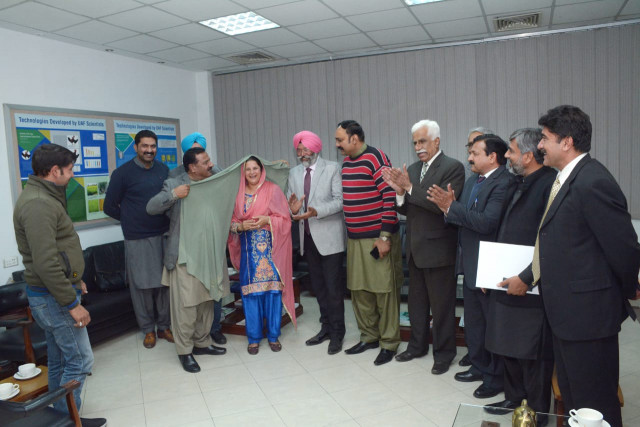Sisters day – well-intentioned but poorly named?
UAF’s planned event on Valentine’s Day raises eyebrows, but defenders say it is for wrong reasons

PHOTO: EXPRESS
The University of Agriculture, Faisalabad’s decision to hold a 'Sister’s Day' event on Valentine’s Day – February 14 – has led to some interesting debates in various forums and garnered media attention that the university may or may not have wanted.
Though technically a Christian feast day in honour of Saint Valentine, ever since the English poet Geoffery Chaucer romanticised it in his Parlement of Foules as a day of love, the date has spread throughout the English-speaking world and beyond as a day to celebrate that most basic of human emotions.
Valentine’s Day is now celebrated in most regions of the world. The custom has gradually but surely taken a large amount of cultural space in Pakistan.
Young people and social media have played a great role in promoting the day, but it is not without its critics.
In much of the Islamic world, including Pakistan, practices relating to the day are discouraged, although no serious official measures have been taken to eliminate the appeal that youngsters had developed for the day, nor have any efforts been made to localise it in line with traditional values.
People of all ages, but especially youngsters, still appear most interested in jumping on the bandwagon of expressing loving feelings every year.
But UAF Vice Chancellor Dr Zafar Iqbal Randhawa has tried to change that by arranging 'Sisters Day' on campus on February 14. The varsity administration plans to distribute over 600 scarfs amongst female students, faculty members, and other staff on February 14.
The VC himself handed out the symbolic first scarf to Nirmal Najeet, an American Sikh member of the student body.
The university has been on the receiving end of both criticism and support for rebranding the western festival with local values. People from all walks of life and from across the country including Lahore, Islamabad, Karachi and Peshawar have been chiming in on social media.
According to a female social media user, “it is ridiculous to imagine male students offering veils, gowns, or scarves to their female counterparts.”
Replying to the comment, another user called the woman “mean and intolerant”. Others questioned why it is being sold as Sisters Day, which demeans the blood relation one has with their actual sister. “Class fellows at best are good friends… not siblings,” said another user.
Some people also suggested that boys should just stay home on the day.
Noting the strong criticism, UAF Spokesman Qamar Bukhari issued a written explanation on the objectives of the event and other related university policies. He said the university administration does not enforce a headscarf requirement and refuted reports that males students have been told to present scarfs or gowns to their female counterparts on February 14. “The idea was to encourage respect for women. Pakistan is entrusted to uphold Muslim culture and traditions. The idea has also been forwarded to other universities,” he said, adding that the administration at the Comsats campus in Sahiwal has also announced Sisters Day on February 14.
The spokesman said that universities served as centres of knowledge and are responsible to train and care for their students like mothers. “The vice chancellor will also cover the head of our sisters just like a mother would.”
On the other side, the head of the public relations department of the university clarified that the institute had only planned the day to provide an alternative to Valentine’s Day and to ensure respect for women and bring them at par with men in terms of opportunities for growth.
The whole world is focusing on increasing the social role of women through the assurance of their rights in line with the rights of men. Agricultural University is linking this goal with its February 14 event, he said. “We want to make the day as a historic example of granting respect to our women. We plan to organise the day every year with the hope that every man in our society will vow to preserve and protect the respect of the women and appreciate their role.”
After this explanation, criticism on social media started to fade out, with more support coming in for the varsity’s intentions, although still not for the event’s name.
Vice-Chancellor Dr Randhawa, when interviewed by The Express Tribune, maintained his stance and gave further clarifications to address any remaining questions. He said the concept of chador and dupatta is a beautiful manifestation of culture for women in eastern societies, especially Pakistan and India, and no one can deviate from the rich practice. The beautiful way in which our religion ensures respect and dignity of the women is unparalleled. Our purpose is to empower our women and ensure a congenial environment for females in our institutions so that they can freely utilise their skills and capabilities and move ahead in life.
He reiterated that the university administration is in no way pressurizing any student to cover their heads. The message is being spread with good intentions, he said, adding that some segments of our society still oppose women’s education. “As a teacher, I want to see our daughters, after completing their matriculation, getting higher education rather than being left to sit at home. We want to see that women feel safe in all other fields, not just medicine, teaching and nursing, and standing shoulder-to-shoulder with men.
Ramal Ayesha, who is doing her MPhil in microbiology, said the varsity’s proposal deserves praise. On February 14, it becomes difficult for us to leave the hostel, she said, adding that people tend to be sceptical of their movements, whether they are going home or to a market. Women may need to go out for any problem or emergency on February 14, but even those visiting hospitals are harassed. “The university’s plan might change the way people think, she added.
Sobia, a student enrolled in the MS in botany programme, said parents who live in different cities always worry about harassment-related problems affecting their daughters. “Many simply choose to not send their daughters to educational institutions after listening to horror stories, many of which are concocted.”
At least now parents will develop a feeling of protection for their daughters, she opined.
Hira and Aqsa, also students at the varsity, said most female students plan to participate in the event.


















COMMENTS
Comments are moderated and generally will be posted if they are on-topic and not abusive.
For more information, please see our Comments FAQ